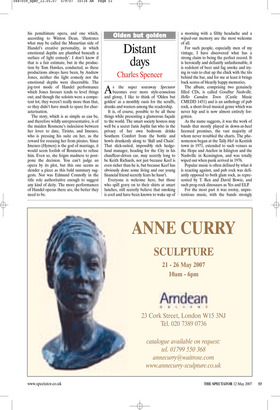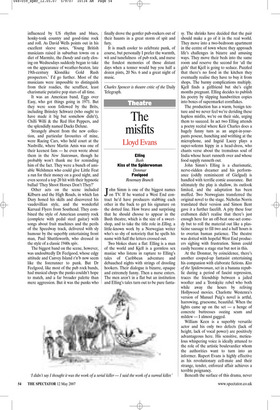Olden but golden
Distant days
Charles Spencer
As the super soaraway Spectator becomes ever more style-conscious and glossy, I like to think of ‘Olden but golden’ as a monthly oasis for the scruffs, drunks and wasters among the readership.
It is, of course, possible to be all these things while presenting a glamorous façade to the world. The smart society hostess may well be a secret Janis Joplin fan who in the privacy of her own bedroom drinks Southern Comfort from the bottle and howls drunkenly along to ‘Ball and Chain’. That slick-suited, impossibly rich hedgefund manager, heading for the City in his chauffeur-driven car, may secretly long to be Keith Richards, not just because Keef is even richer than he is, but because Keef has obviously done some living and our young financial friend secretly fears he hasn’t.
Everyone is welcome here, but those who spill gravy on to their shirts at smart lunches, still secretly believe that smoking is cool and have been known to wake up of a morning with a filthy headache and a wiped-out memory are the most welcome of all.
For such people, especially men of my vintage, I have discovered what has a strong claim to being the perfect record. It is heroically and defiantly unfashionable, it is redolent of beer and fag smoke and trying in vain to chat up the chick with the tits behind the bar, and for me at least it brings back scores of blearily happy memories.
The album, comprising two genuinely filled CDs, is called Goodbye Nashville, Hello Camden Town (Castle Music CMEDD 1451) and is an anthology of pub rock, a short-lived musical genre which was never hip and is now almost entirely forgotten.
As the name suggests, it was the work of bands that mostly played in down-at-heel licensed premises, the vast majority of whom never troubled the charts. The phenomenon began at the Tally Ho! in Kentish town in 1971, extended to such venues as the Hope and Anchor in Islington and the Nashville in Kensington, and was totally wiped out when punk arrived in 1976.
Popular music is often defined by what it is reacting against, and pub rock was defiantly opposed to both glam rock, as represented by T. Rex and David Bowie, and such prog-rock dinosaurs as Yes and ELP.
For the most part it was rootsy, unpretentious music, with the bands strongly influenced by US rhythm and blues, honky-tonk country and good-time rock and roll. As David Wells points out in his excellent sleeve notes, ‘Young British musicians raised in suburban towns on a diet of Marmite, the Dandy and early closing on Wednesdays suddenly began to take on the appearance of weather-beaten, late 19th-century Klondike Gold Rush prospectors.’ I’d go further. Most of the musicians were impossible to distinguish from their roadies, the scruffiest, least charismatic putative pop stars of all time.
It was an American band, Eggs over Easy, who got things going in 1971. But they were soon followed by the Brits, including Brinsley Schwarz (who ought to have made it big but somehow didn’t), Chilli Willi & the Red Hot Peppers, and the splendidly named Ducks Deluxe.
Strangely absent from the new collection, and particular favourites of mine, were Racing Cars, who held court at the Nashville, where Martin Amis was one of their keenest fans — he even wrote about them in the New Statesman, though he probably won’t thank me for reminding him of the fact. They were a bunch of amiable Welshmen who could give Little Feat a run for their money on a good night, and even scored a top 20 hit with their hypnotic ballad ‘They Shoot Horses Don’t They?’ Other acts on the scene included Kilburn and the High Roads, in which Ian Dury honed his skills and discovered his vaudevillian style, and the wonderful Kursaal Flyers from Southend. They combined the style of American country rock (complete with pedal steel guitar) with songs about fruit machines and the perils of the Speedway track, delivered with sly humour by the superbly entertaining front man, Paul Shuttleworth, who dressed in the style of a classic 1940s spiv.
The biggest band on the scene, however, was undoubtedly Dr Feelgood, whose edgy attitude and Canvey Island r’n’b now seem like the forerunner to punk. But Dr Feelgood, like most of the pub rock bands, had musical chops the punks couldn’t hope to match, and a far broader palette than mere aggression. But it was the punks who finally drove the gentler pub-rockers out of their haunts in a great storm of spit and fury.
It is much cooler to celebrate punk, of course, but personally I prefer the warmth, wit and tunefulness of pub rock, and nurse the fondest memories of those distant days when a tenner would buy you half a dozen pints, 20 No. 6 and a great night of music.











































































 Previous page
Previous page